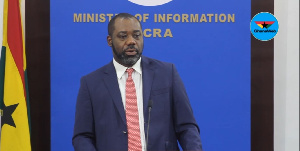- Home - News
- Polls
- Year In Review
- News Archive
- Crime & Punishment
- Politics
- Regional
- Editorial
- Health
- Ghanaians Abroad
- Tabloid
- Africa
- Religion
- Election 2020
- Coronavirus
- Photo Archives
- News Headlines
- Press Release
General News of Thursday, 31 October 2019
Source: ghananewsagency.org
Engage more parents in sexuality education - Group
Participants at a two-day workshop on Parent-Child Communication on Sexuality Education, have called for a deliberate effort to target parents in the implementation of Comprehensive Sexuality Education (CSE) in schools and the community level.
They said the content of the CSE was not inimical to the development of young people especially children in schools and that the involvement of parents, as critical stakeholders, would ensure its successful implementation.
They said if parents become conversant with the content of the CSE, through effective sensitization, it would produce more effective results since parents spend more time with their children.
The workshop, attended by parents with adolescent children, was to build capacities of participants on how to effectively communicate with their children on their sexual and reproductive health.
It was organized by the United Nations Population Fund (UNFPA) Ghana with funding from the Canadian Government.
Participants were taken through topics such as parent and child communication techniques, sexual and gender-based violence, sexually transmitted infections as well as values and societal norms.
During an open forum, all the participants were unanimous that parents should not be left out of the CSE implementation in order to achieve the desired results.
They applauded the UNFPA for leading such a worthy cause and called on all stakeholders to support the implementation for the common good of the young.
Some of them who spoke to the Ghana News Agency (GNA) on the sidelines of the workshop said they had a different opinion about the CSE prior to the workshop, but were now convinced that it was in the interest of both parents and children.
Mrs Diana Asamoah, one of the participants from Buokrom in Kumasi, said the knowledge she acquired at the workshop would not benefit only her household but her entire neighbourhood, as she would take advantage of social gatherings to educate young people on the their sexuality.
Mr Emmanuel Ocran, a parent of a physically-challenged adolescent, said he was now well-equipped to educate his daughter on how to protect herself from anyone who may want to take advantage of her.
He expressed the hope that more parents with disabled children would benefit from such training adding that it was very rewarding.
Dr Abraham Nyarko, a Communication consultant, who facilitated the training, said it is imperative for parents to start talking to their children about sexuality and reproduction before they start dating. He said parents must avoid negative forms of communication which could plant seeds of mistrust and low self-esteem in children.
Children who feel loved and accepted by their parents, he said, are more likely to open up and share their thoughts, feelings and concerns with their parents.
Entertainment










